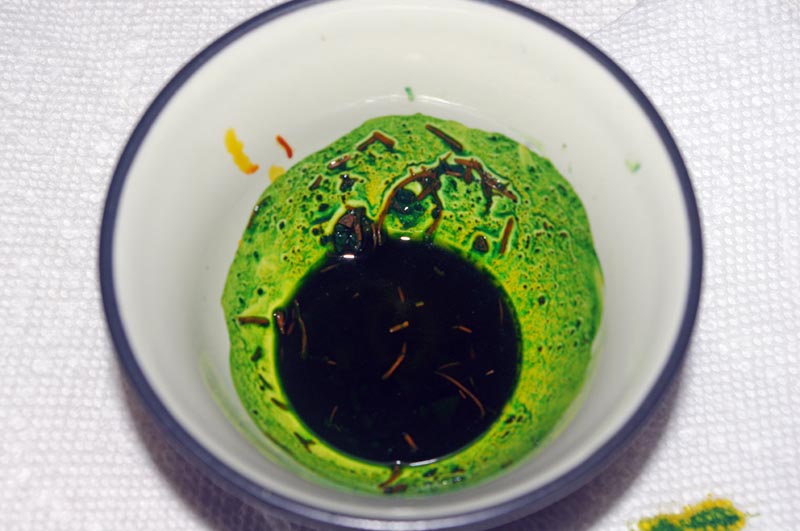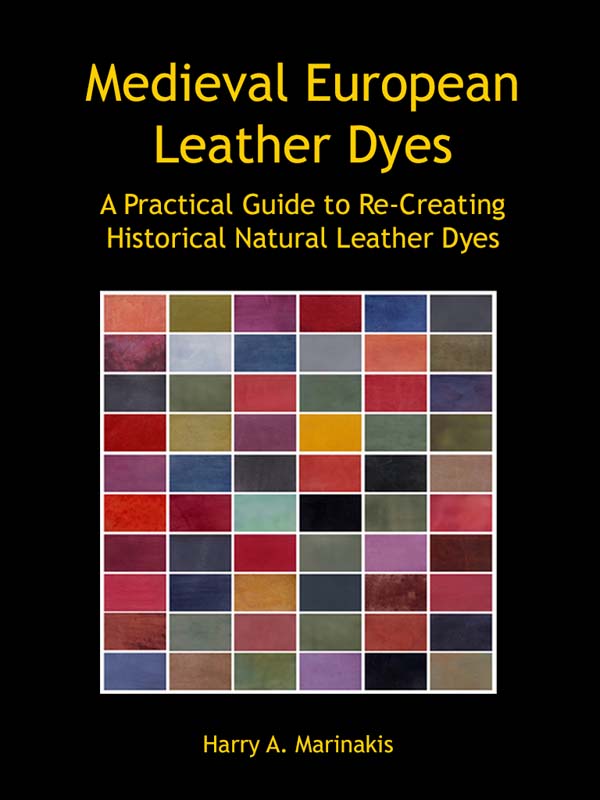| Author |
Message |
Harry Marinakis

|
 Posted: Sun 05 Jan, 2020 6:10 pm Post subject: Posted: Sun 05 Jan, 2020 6:10 pm Post subject: |
 |
|
BLACK
These are the colors that can be achieved with medieval leather dyes, made from iron-tannin and iron-tannic-acid reactions (Iron, vinegar, German vitriol, and green vitriol).
 Attachment: 57.13 KB Attachment: 57.13 KB

|
|
  |
 |
Harry Marinakis

|
 Posted: Sun 05 Jan, 2020 6:10 pm Post subject: Posted: Sun 05 Jan, 2020 6:10 pm Post subject: |
 |
|
PURPLE
These are the colors that can be achieved with medieval leather dyes, made from Brazilwood.
 Attachment: 70.36 KB Attachment: 70.36 KB

|
|
  |
 |
Harry Marinakis

|
 Posted: Sun 05 Jan, 2020 6:11 pm Post subject: Posted: Sun 05 Jan, 2020 6:11 pm Post subject: |
 |
|
GREEN
These are the colors that can be achieved with medieval leather dyes, made from buckthorn berries, indigo, woad, and elderberry.
I was able to get this spectacular green leather dye from a Dutch manuscript recipe, using a mix of vinegar, verdigris, and saffron. Unfortunately, I cannot get it to dye leather at all. YET.
 Attachment: 62.72 KB Attachment: 62.72 KB

 Attachment: 80.07 KB Attachment: 80.07 KB

Last edited by Harry Marinakis on Mon 06 Jan, 2020 4:02 am; edited 2 times in total
|
|
  |
 |
Harry Marinakis

|
 Posted: Sun 05 Jan, 2020 6:12 pm Post subject: Posted: Sun 05 Jan, 2020 6:12 pm Post subject: |
 |
|
YELLOW
These are the colors that can be achieved with medieval leather dyes, made from buckthorn berries and turmeric root.
 Attachment: 70.83 KB Attachment: 70.83 KB

|
|
  |
 |
Harry Marinakis

|
 Posted: Sun 05 Jan, 2020 6:13 pm Post subject: Posted: Sun 05 Jan, 2020 6:13 pm Post subject: |
 |
|
GREY
These are the colors that can be achieved with medieval leather dyes, made from German vitriol.
 Attachment: 49.4 KB Attachment: 49.4 KB

|
|
  |
 |
Mikko Kuusirati

|
 Posted: Sun 05 Jan, 2020 11:41 pm Post subject: Posted: Sun 05 Jan, 2020 11:41 pm Post subject: |
 |
|
| Harry Marinakis wrote: | | I was able to get this spectacular green leather dye using a mix of vinegar, verdigris, and saffron. Unfortunately, I cannot get it to dye leather at all. YET. |
Wow, some dye! 
But in all seriousness, this really is great work, and I'm already finding it very helpful.
Also, perhaps surprisingly or maybe not so much, the artist in me really enjoys the overall color scheme that's emerging, here...
"And sin, young man, is when you treat people as things. Including yourself. That's what sin is."
-- Terry Pratchett, Carpe Jugulum
|
|
  |
 |
Harry Marinakis

|
 Posted: Mon 06 Jan, 2020 3:55 am Post subject: Posted: Mon 06 Jan, 2020 3:55 am Post subject: |
 |
|
BLUE
These are the colors that can be achieved with medieval leather dyes, made from indigo, woad, and elderberry
 Attachment: 73.62 KB Attachment: 73.62 KB

|
|
  |
 |
|
Scott Kowalski
Location: Oak Lawn, IL USA Joined: 24 Nov 2006
Posts: 818
|
 Posted: Mon 06 Jan, 2020 4:44 pm Post subject: Posted: Mon 06 Jan, 2020 4:44 pm Post subject: |
 |
|
Fantastic work Harry. Thank you so much for sharing your findings with us.
Chris Landwehr 10/10/49-1/1/09 My Mom
|
|
  |
 |
Kai Lawson

|
 Posted: Tue 07 Jan, 2020 2:36 pm Post subject: Posted: Tue 07 Jan, 2020 2:36 pm Post subject: |
 |
|
Is your opus going to be publicly available in some way in the near future?
"And they crossed swords."
--William Goldman, alias S. Morgenstern
|
|
  |
 |
Harry Marinakis

|
 Posted: Wed 08 Jan, 2020 8:32 am Post subject: Posted: Wed 08 Jan, 2020 8:32 am Post subject: |
 |
|
|
I'm in the process of writing a manuscript in book format. The book will be limited in scope, with about 15 dyes. I'm thinking of a publishing house that does print on demand. I can't imagine anyone wanting to print a run of this book.
|
|
  |
 |
|
Jonathan U.
Location: United States Joined: 24 May 2014
Posts: 4
|
 Posted: Wed 08 Jan, 2020 8:48 am Post subject: Posted: Wed 08 Jan, 2020 8:48 am Post subject: |
 |
|
|
This is absolutely wonderful and a boon to those of us who want to make use of natural / historical dyes. I'm really looking forward to reading it!
|
|
  |
 |
Harry Marinakis

|
 Posted: Wed 08 Jan, 2020 4:59 pm Post subject: Posted: Wed 08 Jan, 2020 4:59 pm Post subject: |
 |
|
I just finished the manuscript for the book, and it's in review now. Obviously I am not going to become a millionaire with a book like this, so I would like to produce something that's truly useful. Your input would help.
The book has about 150 pages front-to-back, with 40 short chapters.
-one chapter describing the dyer's manuscripts
-sixteen chapters on dye substrates
-seven chapters on various reagents
-fourteen chapters on the best 14 dyes in red, black, purple, blue, green, yellow, grey, and brown
-cross-references for all know medieval leather dyes
-glossary
-bilbiography
-index
I am excluding quite a bit of information, but I think that I am touching on all the key points, and the most illustrative dye recipes. As I state in the preface, "The astute student will be able to apply this knowledge and re-create other dye recipes that are not included in this book."
Does this sound like anything that would be useful? Too much? Too little?
This book is a practical “how-to” guide to re-creating medieval European leather dyes for the historical craftsman, or anyone else who desires to bring natural historical colors to their leather projects. I have selected 14 of the best leather dye recipes from ancient medieval dyer’s manuscripts, and provided step-by-step instructions on how to re-create these historical dyes. The dye colors include red, black, purple, green, blue, yellow, black, grey, and brown.
Contents
1. Introduction
2. General Principles of Using Natural Leather Dyes
3. Medieval Dyer’s Manuscripts
4. Brazilwood
5. Cochineal Insects
6. Madder Root
7. Buckthorn Berries
8. Elderberry
9. Green Vitriol
10. Blue Vitriol
11. German Vitriol
12. Roman Vitriol
13. Shoemaker’s Dye (Atramentum)
14. Elemental Iron
15. Indigo Blue
16. Woad
17. Soap
18. Turmeric Root
19. Saffron Crocus
20. Chalk
21. Gallnuts
22. Gum Arabic
23. Lime
24. Lye
25. Roche Alum
26. Vinegar
27. To Make a Most Perfect Brazil (Plictho #17)
28. To Make a Good Brazil in Another Manner (Plictho #18)
29. To Dye Skins Black (Plictho #173)
30. To Make Black Tanned Skins (Plictho #203)
31. To Dye Skins of a Very Beautiful and Good Purple (Segreti #330)
32. To Make Very Fine Colour of Brazil (Plictho #174)
33. To Dye Skins Blue (Segreti #336)
34. To Dye Skins blue, or of the color of Azure (Piedmont #1)
35. To Dye Skins Green (Segreti #333)
36. Another green of Skins (Booke #15)
37. To Make Skins Yellow (Plictho #207).
38. To Make a Yellow Colour on Skins (Booke #9)
39. To Make a Skin Gray (Plictho #177)
40. To Dye and Tan Skins in Brown (Plictho #181)
Cross Reference by Manuscript
Cross Reference by Color
Cross Reference by Substrate
Bibliography
Illustration Credits
Dyer’s Glossary
Index
 Attachment: 85.59 KB Attachment: 85.59 KB

|
|
  |
 |
Michael P. Smith

|
 Posted: Wed 08 Jan, 2020 6:32 pm Post subject: Posted: Wed 08 Jan, 2020 6:32 pm Post subject: |
 |
|
|
Wow, that’s remarkable! Looking forward to it!
|
|
  |
 |
J. Nicolaysen

|
 Posted: Thu 09 Jan, 2020 6:08 pm Post subject: Posted: Thu 09 Jan, 2020 6:08 pm Post subject: |
 |
|
|
Very well done Harry, thanks for sharing your research and I applaud your dedication to this. I'll buy a book when available. Keep us all posted please
|
|
  |
 |
Harry Marinakis

|
 Posted: Fri 10 Jan, 2020 5:37 am Post subject: Posted: Fri 10 Jan, 2020 5:37 am Post subject: |
 |
|
|
Anything specific or different that people would want in such a book?
|
|
  |
 |
|
Randy Cieszynski
Location: Bourbonnais,IL. Joined: 12 Aug 2012
Posts: 10
|
 Posted: Fri 10 Jan, 2020 6:20 am Post subject: Posted: Fri 10 Jan, 2020 6:20 am Post subject: |
 |
|
I am very interested in this book. A question.....do you cover where to get the ingredients from?
Thanks!
|
|
   |
 |
Harry Marinakis

|
 Posted: Mon 13 Jan, 2020 4:16 am Post subject: Posted: Mon 13 Jan, 2020 4:16 am Post subject: |
 |
|
| Randy Cieszynski wrote: | I am very interested in this book. A question.....do you cover where to get the ingredients from?
Thanks! |
Absolutely!
|
|
  |
 |
Spencer Farrell

Location: Ottawa, Ontario Joined: 14 Sep 2018
Posts: 1
|
 Posted: Sat 02 May, 2020 7:46 pm Post subject: Posted: Sat 02 May, 2020 7:46 pm Post subject: |
 |
|
Just found this thread and natural historical leather dyes is exactly what I'm looking for.
I'll make sure to purchase a copy of this book as soon as it releases.
|
|
  |
 |
|
Dan D'Silva
|
 Posted: Sun 03 May, 2020 7:57 am Post subject: Posted: Sun 03 May, 2020 7:57 am Post subject: |
 |
|
|
Hello Harry and all. This is a great thread. I've been seeking a period yellow leather dye, having just completed a simple test with turmeric and found it to have too little lightfastness for outdoor use. I was wondering if you've looked into barberry. I've come across many brief references to using it on leather, but no specifics on how.
|
|
  |
 |
Harry Marinakis

|
 Posted: Mon 04 May, 2020 12:22 pm Post subject: Posted: Mon 04 May, 2020 12:22 pm Post subject: |
 |
|
I have never heard of barberry. It was not mentioned in any of the manuscripts that I've reviewed.
I'm afraid that, with rare except, none of the medieval dyes are washfast or sunfast.
|
|
  |
 |
|
|

